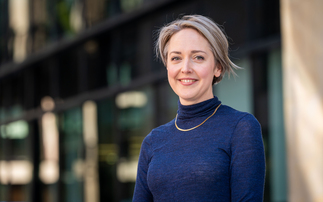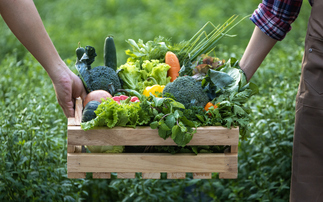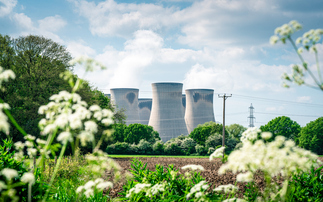The leader of the beverage maker's fleet decarbonization initiatives, Ingrid De Ryck, says the US transportation industry is ready for a "breakthrough and innovative solution"
Earlier this year, Ingrid De Ryck, vice president of procurement and sustainability for beer giant Anheuser-Busch, rode across a stage in Scottsdale, Arizona, on top of a bright red wagon - filled with beer boxes and pulled by the Budweiser Clydesdale horses.
De Ryck's dramatic entrance in front of hundreds of her peers and the media was a teaser for an even more impressive deal she announced a short time later at the event (toting an on-brand bright red Budweiser in hand). Her proclamation: Anheuser-Busch plans to buy up to 800 of Nikola Motor's hydrogen-powered zero-emission semi-trucks to ship its beer around the United States.
The contract is one of the most aggressive and unusual deals announced so far by a large retailer around zero-emission long-haul trucks, a type of vehicle that's proven difficult to electrify economically. With that one planned purchase, Anheuser-Busch could decarbonize its entire group of trucks that move beer from its breweries to wholesalers and cut its carbon emissions from transportation by 18 per cent in the process.
The strategy is one part of the beverage company's goal to slash carbon dioxide (CO2) emissions by a quarter across its entire supply chain by 2025. About 10 per cent of Anheuser-Busch's carbon footprint comes from transportation.
To learn more about the company's sustainable transportation strategy, and its deal with Nikola, I sat down with De Ryck to chat about EV truck charging, why truck startups are leading the way and why decarbonizing transportation is hard.
Katie Fehrenbacher: Can you give me an overview on Anheuser-Busch's overall strategy around sustainability goals for transportation, including shipping and employee transport?
Ingrid De Ryck: Anheuser-Busch's sustainability goals are organized around four big pillars. One of the pillars is about CO2 reduction, and another is about renewable electricity. The second part is to have all of our purchased electricity to come from renewable sources. The first part is to reduce our CO2 emissions across the entire supply chain by 25 per cent. That goes from our suppliers to our consumers — tier 1, 2 and 3 are considered in these goals. It's within this part of the goal that I would frame our sustainability strategy around transportation specifically.
What we've noticed is that the transportation industry here in the US is kind of ready for a breakthrough and innovative solution. When we look at that industry, we're always looking at ways to improve efficiency as well as sustainability in that entire value chain.
So, when I have to look at ways to address sustainability through transportation, I would look at something we call "mode switch." We want to ensure that at every single point in time, we are utilizing the most efficient way of transportation that is available to us in our network. If that's not the case, we switch it. So the optimal mix between rail, intermodal, trucking, etc. We want to make sure we do that optimally and in doing so, reduce emissions as well. That's one way.
The second is what we call route optimization. So we look for ways to reduce mileage and hence reduce our CO2 emissions. But we need to go further than that if we really want to move the needle. And that is where smart routing technologies and smart production planning come into play to not only reduce the total miles we shift, but also the empty miles, or backhaul miles, that don't have a load.
We do that by working with some of our routing partners and some startups. A couple of partners I would mention are Transfix, Uber, Convoy, and then the one that stands out, is SmartHop — they help us reduce our shipment plans and empty miles.
Then a third pillar is about fuel efficiency. To ensure we reduce CO2, we already track all of our utilization of fuel in our shared network, regardless of diesel, electric, [compressed natural gas], etc.
The ultimate goal obviously is to move toward zero-emission vehicles wherever that is possible and use low-emission vehicles everywhere else. So as a company, we are one of the first companies that will get some zero-emission long-haul trucks in their fleet. And we are already transitioning part of our short-haul fleet to low emission fuels like CNG and [renewable natural gas].
So these would be the three pillars of our sustainability strategy around transportation.
Fehrenbacher: What is the fleet size for Anheuser-Busch?
De Ryck: We have about 1 million shipments every year in our tier 1 network. [Note: These are mostly long-haul trucks that move beer from the breweries to the wholesalers.] A third of those 1 million shipments are organized through our dedicated fleet, and two-thirds are over-the-road contractors. So when we talk about our dedicated fleet, I have some vehicle numbers for you: I have between 700 and 900 vehicles [in tier 1].
We also have tier 2 transportation that goes from our warehouses to some of the customers, and we have about 800 vehicles in tier 2 logistics. [Note: Tier 2 is mostly short-haul trucks that move beer from wholly owned distributors to retail outlets].
Fehrenbacher: The company has been aggressive when it comes to partnering with newer players such as Nikola Motors and Tesla. What's the strategy for working with these new transportation companies?
De Ryck: We are buying up to 800 hydrogen-fueled semi-trucks from Nikola Motors, and we ordered 40 Tesla semi-trucks. The idea is that they are complimentary, they are not in competition. We see the use for both of those technologies, and we will look for more technologies to join. The idea is to move our entire dedicated fleet [of tier 1] to zero-emission trucks. Those two deals will allow us to get there. The agreements are big enough to move all of our dedicated fleet into zero emissions. That's the end goal. If we do that, we would reduce our CO2 emissions from transportation by 18 per cent.
Now, of course, when you look at the whole CO2 footprint of the value chain that needs to be reduced by 25 per cent, transportation is just a part of it. That's why we need all of the other pillars to come together too.
Fehrenbacher: Have you been eager to have some of the bigger automakers move into the market to offer these zero-emission trucks? Has it been slow-moving from your perspective?
De Ryck: Let me put it like this: We encourage all of them to accelerate timelines and increase their focus on zero-emission vehicles. How does that sound? I think that is the proper way to say it. We would love them to move faster and increase their focus on it.
The difference between the likes of the big automakers and, say, Nikola Motors is that they are more widespread and have a variety of businesses to address. Whereas Nikola is simpler in terms of structure, they have four big business lines that they bet big on, and it's more focused and they have accelerated timelines as an immediate consequence.
We would be more than happy to pilot and partner with any of the other big vehicle makers. We see, for instance, on the OEM side that there are pilots ongoing on drayage equipment [Note: trucks that move containers short distances at ports], for example in Los Angeles. But what we see so far is not scalable yet. The fastest progress to date has been made by the disrupters. At some point in time, the more traditional players have to come along in order to provide the scale that is needed.
Fehrenbacher: What do you think are the biggest challenges when it comes to decarbonizing transportation with a company like yours?
De Ryck: The biggest challenges are going to be the network. There is no established [electric vehicle] charging network available right now. So we need to build that.
From our companies' perspective, we can build a network together with our partners that works for us but that doesn't address all of the big shippers' needs, right? So, it's only going to be really efficient to decarbonize the transportation industry if we look at the entire network. That would be one of the biggest ones in my opinion.
Fehrenbacher: What about in terms of cost, how much cheaper do some of these new technologies need to be to get to wide-scale adoption?
De Ryck: We've always said, and we believe strongly, that we can use our scale and our size of the company to focus on those sustainability goals where we can really make a difference. Why am I saying that? We are a big shipper. It also means that it's interesting for big companies to partner with us or startups like Nikola to partner with us to get there.
We firmly believe that we need that relationship with big shippers to come to an at-par level [in cost] at least to enable a wide adoption. If it's going to remain significantly more expensive than current technology, which is widely available, the adoption is never going to be widespread across the entire country, and it's never going to be an economically sustainable option.
Fehrenbacher: Do you see policies at the state, federal or local level that would help make this goal of decarbonizing shipping for a company easier?
De Ryck: Yes. I do think that it would help a lot if we, the shipping industry, would get an allowance for increased weight. If you think about the electric truck or hydrogen truck, they have batteries. The pilots we've seen so far are heavier than a diesel truck. That would mean you couldn't put as much beer on it as a regular semi. That's the biggest policy change we would welcome, so we can continue to keep the number of shipments at the level it is or further reduce even, if we're allowed to ship at a bigger weight, as a consequence of the battery. That's one.
I would add onto that, if we really want all of those vehicles to be zero-emission, that means we need to charge them with zero-emission. We can't just put the plug into the wall and charge an electric truck from the normal grid. It needs to be generated in a renewable way through wind or solar. All of the Nikola charging stations will be zero-emission. But that means there comes a cost to those charging stations or locations, to put enough solar panels to fuel those stations. It would be helpful to not further burden any sustainable technology by unnecessary taxes or tariffs.
Fehrenbacher: When you build out charging stations you're also thinking about pairing them with solar?
De Ryck: Yes. An example of that is our partnership with BYD. We are progressing in California, and piloting with BYD to launch 21 electric vehicles there. We can only do that if we can charge them in a renewable way. We are rebuilding on our locations and putting solar panels on [them so we can] fuel those trucks with solar energy. For our tier 2 network — these are heavy-duty trucks, but not for long haul, but shorter distances — we are planning to implement them by the end of this year. And in doing so, we will take out 460 tons of CO2.
Fehrenbacher: Are there other things you'd like to highlight about the company's sustainable transportation strategy?
De Ryck: We're always looking to develop a more sustainable way of living, both at home and at the office. We don't have a set target on how to incentivize our 18,000 colleagues across the country. However, we encourage them to make small changes. We incentivize carpooling or using renewable-fueled vehicles by giving them a preferred parking spot.
Again, I want to emphasize the way we're structured, all our sustainability goals, all four big pillars, are defined in a way that we can use who we are and our size to make the biggest difference. Those goals have been created with the [United Nations Sustainable Development Goals] in mind and in order to make the biggest impact and biggest result on the environment.
In the US, transportation is the No. 1 generator of greenhouse gas emissions. In our company, transportation accounts for 10 per cent of our carbon footprint. So that is our focus now to make the biggest change there.
This article first appeared at GreenBiz.com






